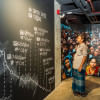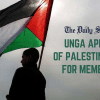Gaza Holocaust and Press Freedom: Drik calls a spade, a spade

In a world where the power of storytelling shapes perceptions, the narrative spun by Western media often takes centre stage. But behind the lofty ideals of freedom of expression and press lies a shadow of hypocrisy, as revealed in a recent panel discussion titled "Western Hypocrisy on Press Freedom", hosted by Drik Gallery on Sunday (May 5).

The event, inaugurating the photo exhibition "Gaza Holocaust: Killing the Truthtellers", delved deep into the nuances of Western media's portrayal of conflicts, particularly the ongoing genocide in Gaza. Moderated by renowned photojournalist Shahidul Alam, the discussion brought together voices echoing a common sentiment: the West's selective adherence to its proclaimed values.

Political analyst Zahed Ur Rahman set the tone by highlighting the biased nature of Western media reports. "The Western media reports based on their interests, geopolitical, political, and cognitive bias," he emphasised. Zahed pointed out the reluctance to use the term "genocide" and the rise of alternative social media channels as a response to mainstream media's narrative control.

"Today's discussion revolves around the activities of the western countries that talk about democracy. As we speak, many people are dying. We have to digest a lot due to the hegemony of the West," said Shahidul Alam.
Research Initiatives, Bangladesh Executive Director Meghna Guhathakurta, who is also a former professor at Dhaka University, added depth to the discussion by highlighting the parochialism embedded within Western media. Sharing personal experiences from her own life, she said, "There is a deep-rooted concept of parochialism in the Western media from which this hypocrisy originates."

"Understanding their parochialism helps us comprehend their hypocrisy," she remarked, unravelling the layers of bias that influence media narratives.
New Age Editor Nurul Kabir drew parallels between how the then Pakistani government labelled the freedom fighters of the Bangladesh War of Independence as terrorists and how Palestinian freedom-seekers are often portrayed as terrorists by the West. According to him, framing the conflict as an Israel-Palestine war is misleading because it suggests a parity in military capacity, which is not the case. He pointed out the significant power disparity between the two sides, emphasising that the current situation is more about control, and power dynamics.

He highlighted the underlying hypocrisy rooted in settler colonialism, describing Israel's actions in Gaza as a form of such colonialism supported by powers such as the US and the UK. "The conflict in Gaza was engineered by major powers to legitimise their authority," he said, adding, "The current situation is all about control, capital and power."

He also noted how powerful entities manipulate public opinion through propaganda to legitimise their actions and further explained the Western media's hypocrisy, saying, "To understand it, we must grasp their politics. They create narratives to justify their actions and normalise them to the public." He mentioned the West's narrative-building tactics, stating that they shape political positions through extensive propaganda aimed at the masses.
"What Israel is doing is not war; it is aggression," he asserted.

However, reflecting a glimpse of hope for the audience, he highlighted the widespread protests against Israeli atrocities in Gaza, comparing them to the anti-Vietnam War protests, noting, "This has instilled hope."
The panellists emphasised the need to decode the politics behind Western media's portrayal of conflicts. Zahed remarked that renowned newspapers such as the Washington Post and the New York Times, often seen as authoritative sources, shape their narratives to serve their own agendas.

"They operate with double standards," Zahed noted, emphasising that all media organisations are influenced by economic and geopolitical factors, even Qatar-funded Al Jazeera that has been applauded for covering Gaza's developments exclusively.
In discussing the intricacies of our modern world, Zahed highlighted its complexity, noting that blanket statements are rarely applicable. He pointed out that while the West champions certain principles like human rights, they often fail to adhere to them consistently.

The discussion extended beyond rhetoric, with the exhibition "Gaza Holocaust: Killing the Truthtellers", showcasing journalists killed while covering Israeli atrocities in Gaza. Curated by ASM Rezaur Rahman, the exhibition features photographs, identities and descriptions of the killings of 142 media persons in Palestine, a forensic investigation of the killing of journalist Shireen Abu Akleh, and cartoons, amongst others. For those martyrs whose images couldn't be retrieved, fresh roses were placed in their honour.

Through poignant photographs and personal accounts, the exhibition served as a stark reminder of the human cost of media censorship and geopolitical agendas. The exhibition will remain open to all from 3pm to 8pm until May 11.

As the panel concluded, questions from the audience unveiled further layers of complexity. The inquiry into Bangladesh's business ties with Israel highlighted the global ramifications of political alliances and the need for transparency in governance.

In the face of mounting challenges to press freedom and the relentless pursuit of truth, events like these serve as beacons of hope. They remind us of the collective responsibility to challenge narratives, regardless of geopolitical interests. At moments like this, when we feel hopeless and helpless, we must raise questions, if nothing else.

 For all latest news, follow The Daily Star's Google News channel.
For all latest news, follow The Daily Star's Google News channel. 









Comments